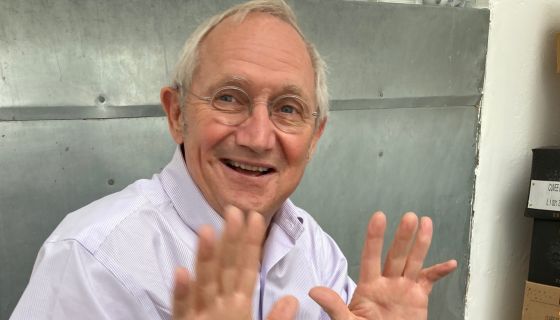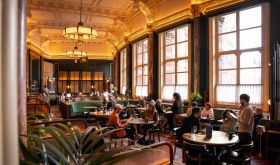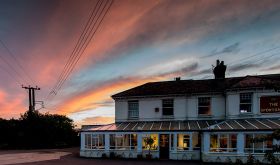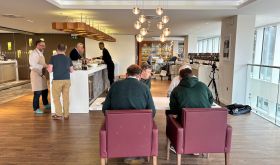You may think that Trevor Gulliver, one of the two founders of St John restaurant in Smithfield, alongside the chef and his closest friend Fergus Henderson, would have little in common with the late explorer Sir Wilfred Patrick Thesiger. But Gulliver and Thesiger are closer than you would imagine.
Both their faces reveal damage to their noses. Thesiger’s came from excessive boxing at Eton and Oxford, where he was awarded four Blues in the sport, while Gulliver’s came from many years playing rugby as a hooker. But, far more pertinently, both have been confronted by an empty quarter.
Thesiger’s was definitely the better-known of the two. In the winter of 1946/7 he became the first person to cross the 650,000 km2 desert known as the Empty Quarter, part of the Arabian Desert, a heroic achievement.
Gulliver’s introduction to his particular empty quarter began in March 2020 as he and Henderson were trying to fly back to London from the US after a book tour to promote their latest cookbook, modestly entitled The Book of St John. ‘We just saw one major US city closing down after another in the face of the pandemic. Then, when we finally managed to get home, we saw what London has become. It too has become an empty quarter.’
Gulliver was referring to the great swathes of closures across the capital as the pandemic took hold. Bars, restaurants, nightclubs, theatres, sandwich shops, coffee shops, cinemas and of course retail in general – the shutdown of all of them was exacerbated by the absence of international travel.
‘Whatever those in other parts of the United Kingdom may say, London is the country’s gateway. Close this and you cut off the easiest way in for the many international travellers who come several times a year to the UK and enjoy what we have to offer and spend money here.’ This is a situation which, Gulliver reports sadly, ‘nobody in government seems to care about’.
The first step was to organise The Welcome Committee, a collection of hitherto undisciplined individuals, which led to the unlikely professional marriage of Gulliver and Gemma Bell of Gemma Bell PR. She in turn, to quote Captain Renault from the film Casablanca, managed to round up the usual suspects: Angela Hartnett MBE, Nick Jones of Soho House, Brian Trollip of Dishoom, chef-restaurateur Richard Corrigan, food campaigner Henry Dimbleby, Karam and Jyotin Sethi of JKS Restaurants, and numerous others.
They have tried to lobby the government on behalf of the hospitality industry. But the lack of progress has clearly led to frustration on the part of Gulliver. ‘At the heart of the matter is that we are caught between the Tory-controlled central government and London’s Labour-controlled City Hall and the result is that nobody is doing anything and nobody seems to care, although I am delighted that Khan has decided that masks on London Transport will still be mandatory’, Gulliver added.
I was lured to St John last Thursday by the prospect of a chat with Gulliver and half an Eccles cake, which this restaurant makes second to none but which, alas, failed to materialise. Nevertheless, the chat was fascinating.
The first issue Gulliver touched on was the financial damage the pandemic has caused. And here the example of what must be one of London’s strongest financial performers has to be salutary. ‘Basically, the last two years have been entirely negative, a total write-off commercially. What we might have achieved in profit, has had to become debt. And the prospects of banks lending to the restaurant industry have declined almost to nothing.’
We were sitting at a table in the bar with Gulliver facing outwards. ‘How many cars can we see going up or down St John Street?’ Gulliver asked before answering, slightly despondently, ‘Not that many’. ‘And how many offices are occupied around here? Not the Save The Children offices across the road nor the big US ticketing agency who moved in next door for a short while. Offices used to provide the basis for our lunchtime business.’
This missing ingredient led to another: the absence of the well-heeled travellers from overseas who, according to Gulliver, would always include one meal at St John, the reward for its remaining true to its idiosyncratic style of cooking over 30 years.
Their absence has obviously hit many hard, particularly those in the travel and hotel industries, but it has managed to forge one unlikely alliance: that between Gulliver and the renowned couturier, Giles Deacon. While Deacon was obviously missing his international clientele, a friendship was formed and the result has been Deacon’s design of a Larry The Lion tea towel. 500 of them are being stored and will eventually surface, Gulliver hopes, when the windows of Fortnum & Mason on Piccadilly eventually mark the reopening of London.
Gulliver’s final lament concerned the closure of so much night-time entertainment across London, on which his and so many other restaurants used to feed: the pre-theatre trade, the post-theatre trade, and, not infrequently, the actors themselves. Gulliver has first-hand experience of this as his St John outlet in The Bridge Theatre has yet to reopen. ‘What I am afraid of is that when we eventually do reopen, the whole city will have moved to a much earlier time disposition and the later, most profitable elements of this trade will have been forgotten’, Gulliver concluded somewhat ruefully.
All this came from the owner of a restaurant whose brand and ethos many would envy. Over the years St John has also established itself as a successful bakery, taking on that role recently for quite a few restaurants that have lost their bakers to the disruption caused by the government’s track and trace app that tells people who have been close to those infected to self-isolate. St John has also become a wine importer. Massive increases in bureaucracy mean ‘we have all become paper-pushers since Brexit’, according to Gulliver, who added, ‘and please don’t let me get going on how many orders for our rosé we have been unable to fulfil recently.’
After an hour of studious listening, I was left acutely aware of Gulliver’s frustration, caught as he and every restaurateur is at the moment between the silence of central government and the impotence of local government. As I was about to say goodbye, Gulliver asked me a question. ‘You’re a clever guy, Nick. Who is the Minister for London?’ I had no idea and thought at first that this was a joke question. ‘It’s an MP called Paul Scully’, came Gulliver’s response. I had never heard of him – and I cannot imagine many of you have either.













